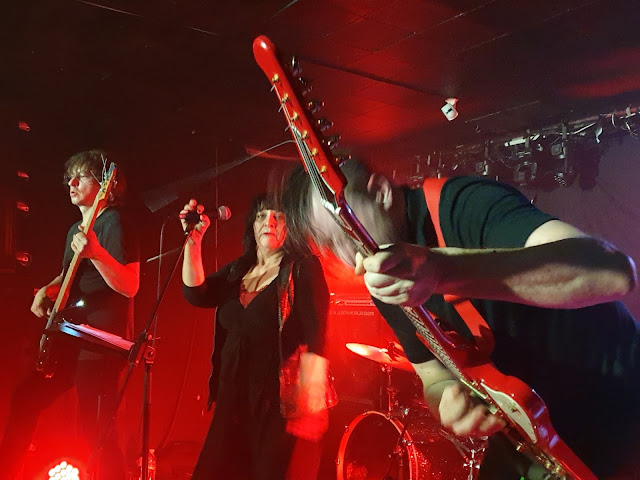LYDIA LUNCH’S RETROVIRUS: BRISBANE HOTEL, HOBART, 1 MARCH 2020
A thick fug of expectation envelops an audience packed into the gig room of Hobart’s
Brisbane Hotel on a rainy Sunday night. It’s the final Australian gig by Lydia
Lunch’s Retrovirus band. It's likely to be the last Tasmanian
performance by an overseas or mainland act for some time given the island
state’s move towards Covid-19 lockdown. The Spanish flu pandemic of 1919 was the last time such policy was necessary.
The setlist
encapsulates the no wave pioneer’s career in various groups (Teenage Jesus and
the Jerks, 8 Eyed Spy, her revered collaborations with Rowland S. Howard) as
well as tributes to admired precursors. Pere Ubu’s proto-punk anthem ‘Final
Solution’ and the glam psych of Alice Cooper’s ‘Black Juju’ sound vital and
celebratory in retroviral reimagining. The only thing missing from this set is
their sledgehammer version of Suicide’s ‘Frankie Teardrop’. ‘Still Burning’ is
dedicated to local hero Howard whose stylistic repurposing of the guitar as
sound generator in The Birthday Party is evoked throughout the set via Weasel
Walter’s effects layering. The experimental guitarist conjures a funnel of
delayed vibrato and feedback during one interlude that could be a wormhole
invitation for Lunch’s ideal revenant to sit in.
The rhythm
section of bassist Tim Dahl and drummer Bob Bert navigate the transition from
surf punk breakdown back to stealth funk noir in ‘Dead Me You B Side’ with
impressive finesse. It’s a song made sleek and elegant in its menace by this
group in contrast with 8 Eyed Spy’s sludge original. Cyberfunk’s at work here:
James Brown’s erotic machinery made angular and osmotic; but its fleshy 70s Miles origins rather than the synthetic odysseys of jungle techno or trip-hop.
Reductionist rhythm guitarist Reggie Lucas, master of the strategic chordal
stab, and the Henderson/Foster rhythm section navigating the burnout fadeout of
Get Up With It‘s ‘Maishya’ or the cavernous slow-mo dub at the
center of ‘Calypso Frelimo’. It’s a seam of fusion potential that was mined more
in late 70s/early 80s English punk funk than the head dancing of Lunch’s New
York no wave partner James Chance. Think the imperialistic motor-skank of PiL’s ‘Careering’ (the superior live
version executed by John Lydon’s original Levene/Wobble dream team on Paris
au Printemps) mixed with the dub-wise surf punk of The Pop Group’s ‘We Are
Time’. It’s a rare alchemy that conjures such a verdant stream of association
from 8 Eyed Spy’s primitive grind, and these ‘sonic brutarians’ (to use Lunch’s
description of her band) have it in spades.
The American
artist has pursued a singular path since the late 1970s as singer, spoken-word
and performance artist. The little girl voice, barbed with enchanting irony,
that makes her 1980 solo album debut Queen of Siam the most accessible
point of entry into her diverse oeuvre has deepened with time into a husky
growl. Imagine a higher-pitched Tom Waits (whose ‘Heart Attack and Vine’ she
covered for the soundtrack of the 2006 film East of Sunset) etched with,
most notably in Big Sexy Noise’s ‘Gospel Singer’, the jagged edges of Janis
Joplin. The pride she feels in achieving her ideal vocal form is palpable when
she teases the females in the audience. Wouldn’t they like to know how to get
one? No way but practice, wayward experience and copious tobacco, girls. The
path of originality is seldom a safe one.
Lydia’s voice,
like her unique guitar playing in Teenage Jesus has always been
a blunt if malleable instrument for psychic surgery. Not for her the searing
sonority of fellow Goth rock icon Siouxsie Sioux on ‘Swimming Horses’: a voice
that soothes as it terrifies. The cinematic trailer park sex kitten vibe Lunch created
on Queen of Siam is nevertheless irresistible on the catchy silliness of
‘Atomic Bongos’, haunting on her fantastic duet with Howard, the 1982 cover of
Lee Hazlewood and Nancy Sinatra’s ‘Some Velvet Morning’ (a song some in this
audience probably know her best for). It established a template for riot grrls
to follow, but only Jennifer Herrema would take to magical heights of
psychedelic derangement on Royal Trux’s Twin Infinitives.
Lunch has
continued to meld intimacy and caustic declamation with ever greater affect over
prog/jazz/ambient/experimental soundscapes in her ‘illustrated word’ releases,
achieving a Burroughsian torch drawl on the 2016 release My Lover the Killer
with Marc Hurtado and her 2018 Sadean tribute Marchesa with Stefano
Rossello. It would be churlish though to express a preference for this avant-garde
spoken-word direction to Lunch as rock singer given how much she owns songs as
disturbing and revealing as ‘Mechanical Flattery’ on stage. It’s not just dynamic
self-assurance. She’s also backed by musicians who are longtime friends more
than just collaborators. Weasel Walter in
particular is a true believer, studying the specific microtonality of the
clusters she employed in Teenage Jesus with the diligence of a
PhD musicologist investigating the tonal dynamics of an Earle Brown string quartet.
Another of
her collaborators, Eugene S. Robinson of avant-blues outfit Oxbow, defies
stereotypical notions of ‘soul’ technique and all its signifying coloratura for
black artists with the same virulence as she does with preconceptions of the
feminine voice. Both express an abject performative sexuality, but tonight’s
performance is not one of emotional extremes. The predominant mood, discernable
in Lunch’s witticisms as much as Weasel’s hardcore guitar heroics, is one of fun
despite the darkness of the lyrical material. A phalanx of her rowdier
female fans at the front of the stage helps keep the mood relaxed. To adopt a
Venn diagram meme argot, everyone’s partying like it’s ((Covid-(19)(19)99)).
© Text & Photos Copyright Jon
Kromka 2020





Comments
Post a Comment